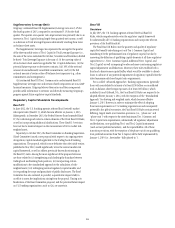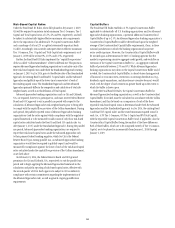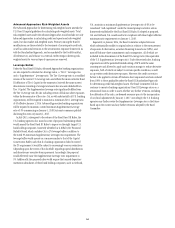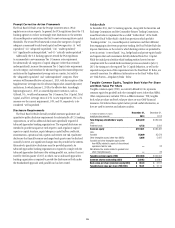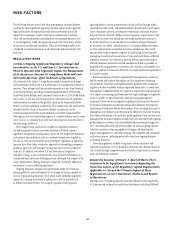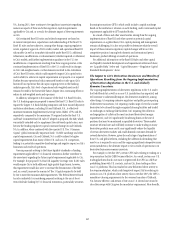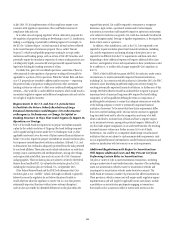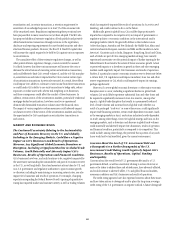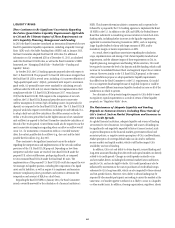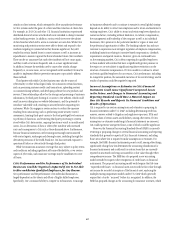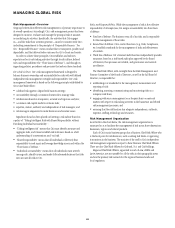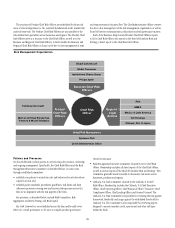Citibank 2013 Annual Report Download - page 79
Download and view the complete annual report
Please find page 79 of the 2013 Citibank annual report below. You can navigate through the pages in the report by either clicking on the pages listed below, or by using the keyword search tool below to find specific information within the annual report.61
(or further downgrade) of U.S. debt obligations or U.S. government-related
obligations, or concerns that such a downgrade might occur, could negatively
impact Citi’s ability to obtain funding collateralized by such obligations and
the pricing of such funding, as well as the pricing or availability of Citi’s
funding as a U.S. financial institution, among other impacts. Any further
downgrade could also have a negative impact on U.S. and global financial
markets and economic conditions generally and, as a result, could have a
negative impact on Citi’s businesses, results of operations, capital, funding
and liquidity.
Citi’s Extensive Global Network Subjects It to Various
International and Emerging Markets Risks as well as
Increased Compliance and Regulatory Risks and Costs.
During 2013, international revenues accounted for approximately 59%
of Citi’s total revenues. In addition, revenues from the emerging markets
accounted for approximately 41% of Citi’s total revenues in 2013.
Citi’s extensive global network subjects it to a number of risks associated
with international and emerging markets, including, among others,
sovereign volatility, political events, foreign exchange controls, limitations
on foreign investment, sociopolitical instability, fraud, nationalization,
closure of branches or subsidiaries and confiscation of assets. For example,
Citi operates in several countries, such as Argentina and Venezuela, with
strict foreign exchange controls that limit its ability to convert local currency
into U.S. dollars and/or transfer funds outside the country. In such cases,
Citi could be exposed to a risk of loss in the event that the local currency
devalues as compared to the U.S. dollar (see “Managing Global Risk—
Cross-Border Risk” below). There have also been instances of political
turmoil and other instability in some of the countries in which Citi operates,
including in certain countries in the Middle East and Africa, to which Citi
has responded by transferring assets and relocating staff members to more
stable jurisdictions. Similar incidents in the future could place Citi’s staff and
operations in danger and may result in financial losses, some significant,
including nationalization of Citi’s assets.
Citi’s extensive global operations also increase its compliance and
regulatory risks and costs. For example, Citi’s operations in emerging
markets, including facilitating cross-border transactions on behalf of its
clients, subject it to higher compliance risks under U.S. regulations primarily
focused on various aspects of global corporate activities, such as anti-money-
laundering regulations and the Foreign Corrupt Practices Act. These risks
can be more acute in less developed markets and thus require substantial
investment in compliance infrastructure or could result in a reduction in
certain of Citi’s business activities. In addition, any failure by Citi to comply
with applicable U.S. regulations, as well as the regulations in the countries
and markets in which it operates as a result of its global footprint, could
result in fines, penalties, injunctions or other similar restrictions, any of
which could negatively impact Citi’s earnings and its reputation. Citi also
provides a wide range of financial products and services to the U.S. and other
governments, to multi-national corporations and other businesses, and to
prominent individuals and families around the world. The actions of these
clients involving the use of Citi products or services could result in an adverse
impact on Citi, including adverse regulatory and reputational impact.
There Continues to Be Uncertainty Relating to Ongoing
Economic and Fiscal Issues in the Eurozone, Including
the Potential Outcomes That Could Occur and the Impact
Those Outcomes Could Have on Citi’s Businesses, Results of
Operations or Financial Condition.
Several European countries, including Greece, Ireland, Italy, Portugal
and Spain (GIIPS), have been the subject of credit deterioration due
to weaknesses in their economic and fiscal situations. Concerns have
been raised, both within the European Monetary Union (EMU) as well
as internationally, as to the financial, political and legal effectiveness
of measures taken to date, the ability of these countries to adhere to any
required austerity, reform or similar measures and the potential impact of
these measures on economic growth or recession, as well as deflation, in
the region.
There have also been concerns that these issues could lead to a partial or
complete break-up of the EMU. The exit of one or more member countries
from the EMU could result in certain obligations relating to the exiting
country being redenominated from the Euro to a new country currency.
Redenomination could be accompanied by immediate revaluation of
the new currency as compared to the Euro and the U.S. dollar, the extent
of which would depend on the particular facts and circumstances. Any
such redenomination/revaluation could cause significant legal and other
uncertainty with respect to outstanding obligations of counterparties and
debtors in any exiting country, whether sovereign or otherwise, and could
lead to complex, lengthy litigation. Redenomination/revaluation could also
be accompanied by the imposition of exchange and/or capital controls,
required functional currency changes and “deposit flight.”
These ongoing uncertainties have caused, and could in the future cause,
disruptions in the global financial markets and concerns regarding potential
impacts to the global economy generally, particularly if sovereign debt
defaults, significant bank failures or defaults and/or a partial or complete
break-up of the EMU were to occur. These ongoing issues, or a worsening of
these issues, could negatively impact Citi’s businesses, results of operations
and financial condition, particularly given its global footprint and strategy,
both directly through its own exposures as well as indirectly. For example,
Citi has previously experienced widening of its credit spreads and thus
increased costs of funding due to concerns about its Eurozone exposure. In
addition, U.S. regulators could impose mandatory loan loss and other reserve
requirements on U.S. financial institutions, including Citi, if a particular
country’s economic situation deteriorates below a certain level, which could
negatively impact Citi’s earnings, perhaps significantly.


